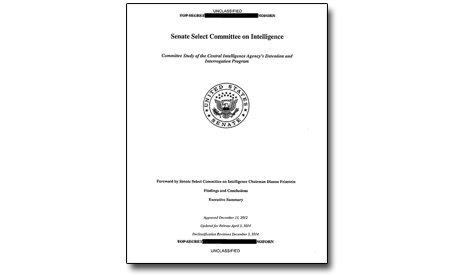
This is a copy of the cover of the CIA torture report released by Senate Intelligence Committee Chair Sen. Dianne Feinstein D-Calif., Tuesday, Dec. 9, 2014. (Photo: AP)
Despite the outrage caused by the controversial landmark 6,000 page CIA torture report that was released on Tuesday, analysts believe that as gruesome as it was, the report will have little effect on American public opinion. At the same time analysts also stated that it will be harder for the US to lecture Middle Eastern countries about their human rights records
The report was heavily criticised, in terms of the legality and effectiveness with respect to violent methods of interrogations carried out by the CIA.
Illegal torture violations mentioned in the report included officers’ threats to harm detainees’ children, sexually abuse their mothers, and “cut a detainee’s mother’s throat.” Some of the offficers in the CIA’s Detention and Interrogation Program included individuals engaged in inappropriate detainee interrogations, who reportedly admitted to sexual assault.
One of the issues of effectiveness revealed in the report was that these illegal torture methods never even yielded intelligence about imminent terrorist attacks, as concluded by the investigation.
Is the report a "game changer?”
Even though initial reports on the CIA's interrogation techniques in the aftermath of the Sep. 11 attacks gave the public a sense for these violations, Tuesday’s official report came as a shock to many observers.
“This is the kind of thing that goes beyond horrific,” the director of Amnesty USA’s security and human rights programme, Naureen Shah said. “It shows exactly how free the US government felt to commit torture with impunity," she added.
Former National Security Agency contractor Edward Snowden said Wednesday that “the report is extraordinary for a number of reasons... The things we did as a result of this programme are inexcusable crimes."
Despite the backlash and criticism the report has fueled, is it possible that there will be a radical change in public perception?
Karim Bitar, Senior Fellow at the Institute for International and Strategic Relations told Ahram Online that such change is unlikely to occur, as the CIA's credibility was not exactly stellar to begin with.
Bitar pointed out that there have been a lot of scandals and cover-ups in the past and that nothing has changed. Nonetheless, Bitar does feel that America’s liberals will be outraged while ideological currents and conservatives will believe they must support the agency no matter what.
"Obama stopped the most egregious practices but never broke entirely with the Bush/Cheney state of mind. In the name of pragmatism, he missed an opportunity to do away with this system. He merely gave it a facelift” Bitar explains.
Majid Rafizadeh, a member of Harvard International Review's advisory board, seems to agree with Bitar on how much of the agency’s credibility the report will compromise. Rafizadeh believes that many Americans were already cognizant of the CIA's torture methods and White House efforts to conceal information.
Iranian-American Analyst and UN veteran Negar Mortazavi thinks otherwise. Mortazavi told Ahram Online that Americans were against the initial reports and sent a clear message by electing President Obama to end it when in reality, deeper and darker layers of torture have been revealed.
"I think the majority of Americans will oppose it and hopefully we will see more sustainable change," Mortazavi adds.
Implications for the Middle East
Many say the US will no longer be able to “lecture” Middle Eastern governments on human rights, especially after the exposures on rendition. Suspects were illegally transferred outside the US to secret American detention centers in Afghanistan, Poland and Romania.
The US encouraged governments to agree to the “black sites” by providing millions of dollars to foreign government officials.
According to the report, some governments in the Middle East allowed renditions, such as Egypt, Morocco, Saudi Arabia, Syria, Jordan and the United Arab Emirates.
Bitar feels that the US has lost its "moral high-ground" and that its soft power has considerably weakened at a time when hard power is much less effective, as we have seen in Iraq and Afghanistan.
Iran has already been capitalising on this report to criticize human rights abuses carried out by the United States, Rafizadeh said.
Mortazavi told Ahram Online that Middle Eastern governments will use this report as an opportunity to claim that human rights are a political matter for the United States. "This will damage the image of the United States in the Middle East" she said.
Rafizadeh says that it is unlikely to shift the geopolitical US-Middle Eastern alliances and rivalries. Human Rights Watch’s executive director Kenneth Roth said “unless this important truth-telling process leads to prosecution of officials, torture will remain a ‘policy option’ for future presidents.”
Short link: